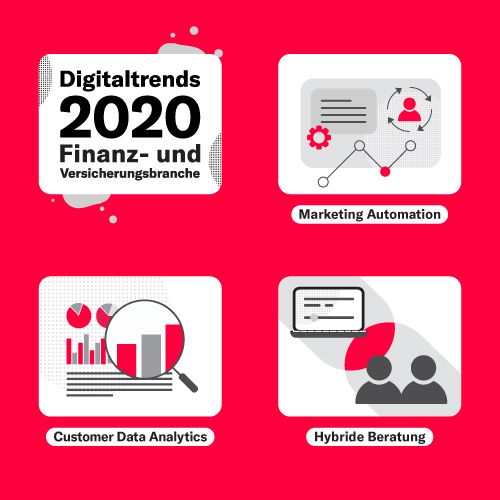Digital trends 2020 for the finance and insurance industry
These developments influence the success of financial service providers

St. Gallen / Frankfurt, 11 February 2020 - Technology never sleeps, not even in the financial and insurance sectors. The new year brings with it some developments that will be important for the industry: Namics, one of the leading Swiss full-service digital agencies, has identified three key digital trends for 2020. Dr. Roman Zollet, financial expert and Senior Principal Consultant at Namics, knows how financial service providers have to deal with them in order to compete.
Trend 1: Marketing automation - learning from the challengers
For a long time, the financial sector, and especially banks, found it difficult to communicate digitally and data-based with their customers. However, thinking in terms of customer journeys has now become established and the next step is now to create the appropriate interactions and to play them out automatically.
The goal is automatic individual communication with customers - based on their enriched user profiles. "Every interaction should follow the next-best-action approach, i.e. offering customers the next action with digital access at every digital touch point on the customer journey," advises Zollet. "Financial service providers should view and analyze the customer journey from an outside-in perspective. It's also worthwhile to test fresh and bold interaction options. That's how you constantly learn." Pioneers in the field of marketing automation are Fintech and Challenger banks, which are exclusively digital.
Trend 2: Customer Data Analytics - remaining relevant
Customers expect excellent advice and support from their financial service providers in order to achieve their own (financial) goals. Traditionally, they often approached the financial advisor with their wishes - this is now often done the other way around: Financial service providers use Customer Data Analytics and can anticipate their needs. The technology not only provides valuable knowledge, insights and advice for proactive action and consulting: Its potential applications range from churn prevention to up-selling and fraud detection.
Customer Data Analytics thus raises personalization and the perceived value of consulting to a whole new level. The risk of missing or even losing opportunities with your customers is thus considerably reduced. "I recommend starting small with customer data analytics for proactive measures, for example with a single use case," says Zollet. "This can then be tested with the help of a pilot group, obtain personal feedback, adapt it accordingly, expand it if necessary and - very importantly - review it again.
Trend 3: Hybrid consulting - intelligently combining digital and analogue
Online and offline consulting are increasingly merging - also in the financial sector. For a hybrid consulting approach, however, the transitions must work perfectly. A new intelligence of interaction guarantees a first acceptable level of consistency - and some financial services providers have already started to invest in appropriate digital solutions. They allow part of the advisory process to be carried out digitally and then to be followed up in a personal meeting. Thanks to intelligent systems, the self-service options at the point of entry lead to greater efficiency for both sides. In addition, providers can better prepare for advisory meetings, avoid the loss of data and information and achieve direct visibility. For customers, this means above all flexibility, convenience and seamless advice on different channels.
The expert's practical tip is: "To penetrate the consulting process from A to Z, insurance companies and banks need a solid understanding of the user journey, the business logic and the existing and necessary technology architecture," says Zollet. "When these three perspectives come together, added value is created for all sides: for the interested party or customer as well as the provider. However, this also requires organizational change at the provider, which is typically underestimated.




